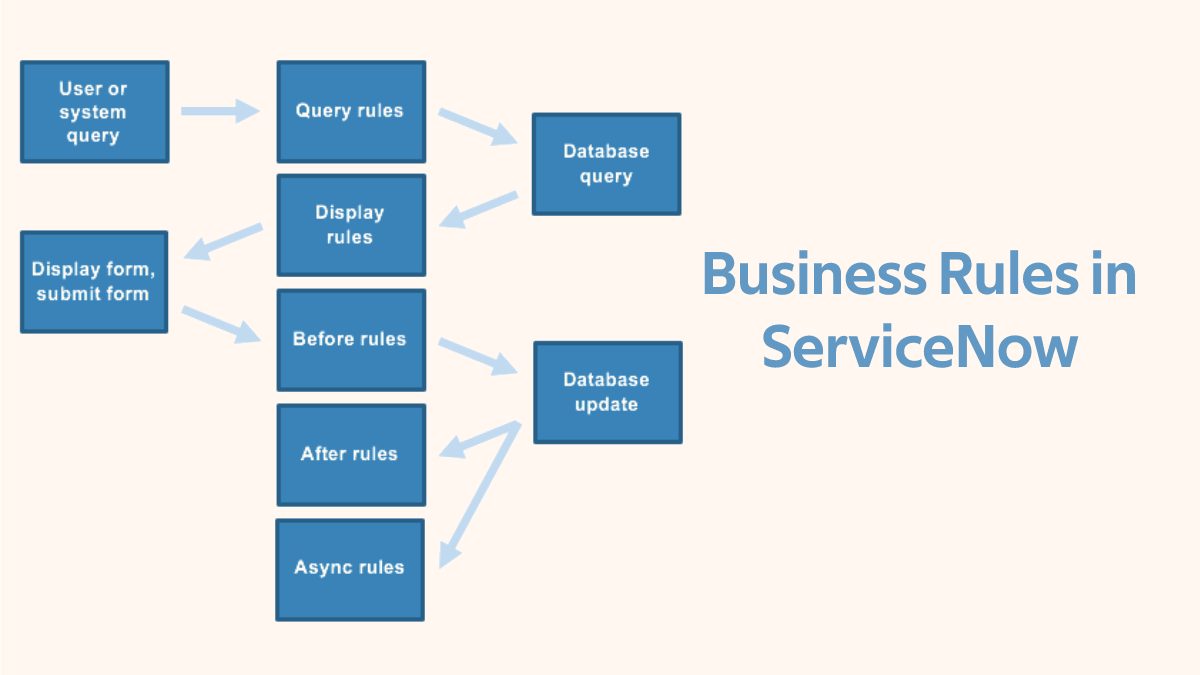Business Rules in ServiceNow: A business rule is a server-side script that runs when a record is displayed, inserted, updated, deleted, or when a table is queried.
Use business rules in ServiceNow are helpful to perform tasks such as automatically changing values in form fields when certain conditions are met or creating events for email notifications and scripted actions.
Note: Business rules can use scripts to take action on records in the database.
However, several other scripting options are available on the platform, such as B. Client scripts and user interface actions.
Table of Contents
How Business Rules in ServiceNow Work?
To configure business rules, you must first determine when to run the business rule and what action to take.
When business rules are enforcing.
Business rules that we execute depends on two sets of criteria:
The business rule is configuring to run on a record that we can modify or access.
The database operation that the system does in the registry.
Then, following options are to provide and determine when the business rule should run.
Time at which the business rule should run
Option–>When the control is executed
Before–>the user submits the form, but before any action is taken added to the record in the database.
After–>the user submits the form and action that we take in the database.
Async–>When the scheduler is running the scheduled job that cretaes the business rule.
The system makes a schedule job of the business rule after the user submits the form and after taking action on the record in the Database.
Display–>Before the form is displaying to the user, right after the data it is read from the database.
Trading Rules Actions
Also, Business rules can perform a variety of actions. Common types of shares are:
Change field values in a form that the user updates.
Field values are setting to some specific values available for that field, values copying from other areas, and relative values determine by the user role.
Also, it displays informational messages to the user.
Change child task values based on changes in parent tasks.
Users from accessing or changing specific fields on a form.
Abort the current database transaction.
For example, if the certain conditions are meeting, it prevents the user from saving the record to the database.
Administrators can set field values, create informational messages, and cancel transactions without writing a script.
business rules in servicenow, types of business rules in servicenow, business rules examples in servicenow.
different types of business rules in servicenow, what is business rules in servicenow, business rules.
acl in servicenow, snow rule, rules of business, business rule in servicenow, servicenow, servicenow developer, servicenow share price, servicenow interview questions.
Avoid recursive trading rules
Avoid using current.update () in a business rules script. The update () method triggers the execution of business rules on the same table for insert and update operations, resulting in a business rule calling itself over and over again.
Changes made to pre-business rules are automatically saving when all pre-business rules are complete, and according to business rules are best in use to update relating to outdate objects.
When a recursive business rule is detecting, the system stops it and records the error in the system log.
However, current.update () causes system performance problems and is never necessary.
You can avoid recursive business rules by using the setWorkflow () method with the false parameter.
The combination of the update () and setWorkflow () methods we only recommend in special cases where the normal before and after guidelines as we mention above do not meet your requirements.

